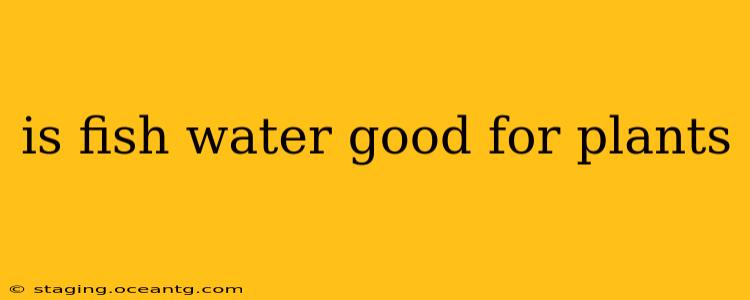Many gardeners have wondered if fish water, the water leftover after cleaning a fish tank, can benefit their plants. The answer is a resounding yes, but with important caveats. Fish water, when used correctly, provides a natural and effective fertilizer rich in nutrients crucial for plant growth. However, improper use can harm your plants, so understanding the "why" and "how" is essential.
What Nutrients Does Fish Water Contain?
Fish waste, the primary component making fish water valuable to plants, is a rich source of nitrogen, phosphorus, and potassium – the three major macronutrients plants need for healthy growth. These are often found in synthetic fertilizers, but fish water offers a natural, organic alternative. Specifically:
- Nitrogen (N): Essential for leaf growth and chlorophyll production. Fish waste contains ammonia, which converts to nitrites and then nitrates—the forms plants can readily absorb.
- Phosphorus (P): Crucial for root development, flowering, and fruiting. Fish waste contributes to phosphorus levels in the water.
- Potassium (K): Important for overall plant health, disease resistance, and water regulation. While less abundant than nitrogen and phosphorus, fish water still provides some potassium.
In addition to these macronutrients, fish water contains micronutrients, albeit in smaller quantities. These include iron, magnesium, and other trace elements that contribute to overall plant vigor.
How Does Fish Water Benefit Plants?
The benefits of using fish water as fertilizer are numerous:
- Natural and Organic: It's a sustainable and environmentally friendly alternative to chemical fertilizers.
- Cost-Effective: It repurposes waste, saving you money on expensive commercial fertilizers.
- Nutrient-Rich: Provides a balanced mix of macronutrients and micronutrients vital for plant health.
- Improved Soil Health: The organic matter in fish water contributes to better soil structure and water retention.
How to Use Fish Water Safely and Effectively for Plants
While fish water offers numerous benefits, using it improperly can harm your plants. Here’s a safe and effective approach:
How Often Should I Water My Plants with Fish Water?
This depends on several factors, including the concentration of fish waste in the water, the type of plant, and the size of your plants' root systems. As a general guideline:
- Dilute the fish water: Never use undiluted fish water directly on plants. Always dilute it with at least 10 parts water to 1 part fish water (a 10:1 ratio). For sensitive plants, consider a higher dilution ratio (e.g., 20:1).
- Start Slowly: Begin with a smaller amount and observe your plants’ response. If you see no negative effects, you can gradually increase the amount and frequency.
- Avoid Overwatering: Fish water, like any fertilizer, can burn plants if overused. Water only when the soil feels dry to the touch.
What Plants Benefit Most from Fish Water?
Most plants can benefit from fish water, but those that are particularly heavy feeders, such as leafy greens, tomatoes, and peppers, tend to respond favorably.
Can Fish Water Harm My Plants?
Yes, if not used properly. Undiluted fish water is toxic to plants due to high ammonia levels. Over-fertilizing with diluted fish water can also lead to nutrient burn, resulting in wilting, yellowing leaves, and stunted growth.
What are the Signs of Over-Fertilization with Fish Water?
Watch out for these symptoms:
- Leaf burn: Brown or yellow edges or tips on leaves.
- Wilting: Even with adequate watering.
- Stunted growth: Plants may appear smaller and weaker than usual.
- Root rot: Overly wet soil combined with high nutrient levels can lead to root rot.
Is it Safe to Use Fish Water on All Types of Plants?
While many plants thrive with fish water, some are more sensitive than others. Start with a highly diluted solution and gradually increase the concentration as needed, always monitoring your plants' health closely.
By following these guidelines, you can harness the power of fish water to nourish your plants naturally and sustainably, while avoiding potential harm. Happy gardening!
